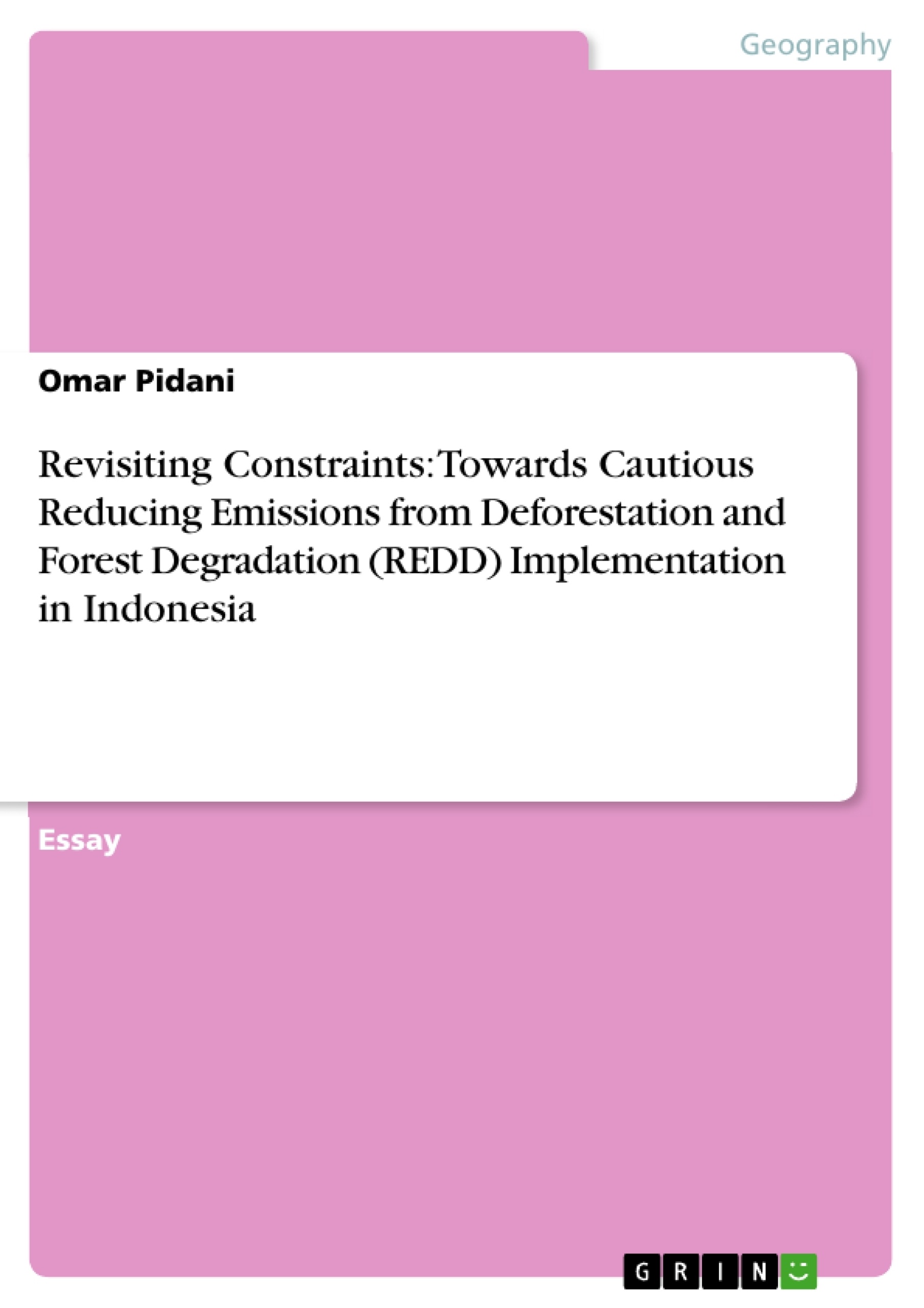As one amongst few countries with largest forest coverage, Indonesia puts a lot of hopes of benefitting from Reducing Emissions from Deforestation and Degradatoin (REDD) Implementation, a program strongly believed as incentive for forest protection in developing countries. Yet, like many programs in the past, some doubt that REDD will be smoothly implemented.
This paper tries to revisit some of the major obstacles put forward by scholars and practitioners. These include the issue of leakage and land tenure insecurity, as well as the issue of carbon pricing which are crucial in determining whether or not incentive offered by REDD is more attractive than incentives to deforest.
A discussion about factors that contribute to leakage and land tenure insecurity is then followed by a simple calculation to predict whether price of carbon credit per hectare offered at REDD Project in Ulumasen Forest is much more interesting than revenue obtained from logging that one hectare. This calculation indicated that the incentive to forest logging surpassed the incentive to conserve as a result of carbon credit. It is recommended that careful and transparent feasibility study prior to REDD implementation to avoid its inevitable marginalizing impacts particularly for forest-dependent people.
Inhaltsverzeichnis (Table of Contents)
- I. Introduction
- II. Methodology
- 2.1. The Research Methodology: the Thematic Analysis
- 2.2. Data Collection Method and Analysis
- III. Revisiting Issues of REDD Implementation
- 3.1. The 'Leakage' Issue
- 3.1.1. The macro-effect of forest and land-use policies
- 3.1.2. Commercialization of agro-industrial monoculture products
- 3.1.3. Unpredictable Impact of Traditional Use of Fire
- 3.1.4. Perverse Right to Deforest and Misuse of PES Funds
- 3.1.5. Determining the Right Beneficiaries
- 3.1.6. Efficient and Fair Payment Distribution Mechanism
- 3.2. Land Tenure Insecurity Issue
- 3.3. Carbon Credit Pricing Issue
- 3.1. The 'Leakage' Issue
- IV. Conclusion and Recommendation
- Reference
- Appedix 1
Zielsetzung und Themenschwerpunkte (Objectives and Key Themes)
This paper aims to revisit key constraints that must be considered for effective REDD implementation in Indonesia. It examines issues that could hinder REDD's effectiveness and potentially create disincentives for sustainable forest management. The focus is on highlighting the critical factors that need to be addressed to ensure REDD becomes a true incentive for forest protection.
- The issue of leakage and how forest and land-use policies can contribute to it
- Land tenure insecurity and its impact on REDD implementation
- Carbon credit pricing and its role in determining the attractiveness of REDD incentives compared to deforestation
- The need for careful and transparent feasibility studies before implementing REDD to avoid unintended consequences
- The potential for REDD to create disincentives for sustainable forest management in Indonesia
Zusammenfassung der Kapitel (Chapter Summaries)
- I. Introduction: This chapter introduces the concept of REDD and its potential benefits for Indonesia, a country with significant forest coverage. It highlights the potential challenges to REDD implementation, including leakage, land tenure insecurity, and carbon pricing. The paper argues that REDD, like other environmental preservation-based credit schemes, may not be a panacea for forest degradation problems in Indonesia.
- II. Methodology: This chapter outlines the research methodology used in the paper, which is thematic analysis. It describes the data collection method, mainly document study, and the process of analyzing the collected data.
- III. Revisiting Issues of REDD Implementation: This section delves into key issues related to REDD implementation in Indonesia, focusing on the 'leakage' issue and its various contributing factors, including the macro-effect of forest and land-use policies, the commercialization of agro-industrial monoculture products, and the unpredictable impact of traditional use of fire. It also discusses the challenges related to land tenure insecurity and carbon credit pricing.
Schlüsselwörter (Keywords)
The main keywords and focus topics of the text include: REDD, deforestation, forest degradation, leakage, land tenure insecurity, carbon credit, carbon pricing, Indonesia, and sustainable forest management.
Frequently Asked Questions
What is REDD and why is it important for Indonesia?
REDD stands for Reducing Emissions from Deforestation and Forest Degradation. It is important for Indonesia because the country has one of the largest forest coverages globally and could benefit from financial incentives for forest protection.
What are the main obstacles to REDD implementation in Indonesia?
Key obstacles include the issue of leakage, land tenure insecurity, and the challenges of carbon credit pricing compared to revenues from logging.
What does the term 'leakage' mean in the context of REDD?
Leakage refers to the risk that protecting one forest area simply shifts deforestation activities to another area, thereby negating the overall emission reductions.
How does carbon pricing affect the success of REDD projects?
If the price of carbon credits is lower than the potential revenue from logging or agro-industrial activities, there is a strong economic incentive to continue deforestation instead of conserving forests.
What is recommended before implementing a REDD project?
The paper recommends conducting careful and transparent feasibility studies to avoid marginalizing forest-dependent people and to ensure sustainable forest management.
- Quote paper
- Omar Pidani (Author), 2008, Revisiting Constraints: Towards Cautious Reducing Emissions from Deforestation and Forest Degradation (REDD) Implementation in Indonesia, Munich, GRIN Verlag, https://www.hausarbeiten.de/document/337001


